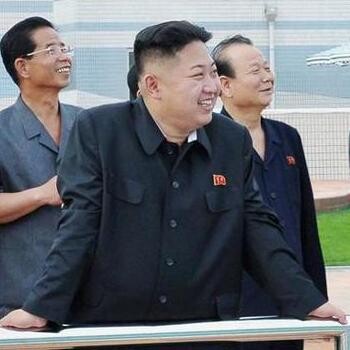hankyoreh
Links to other country sites 다른 나라 사이트 링크
Economic reforms appear under way in North Korea

By Kim Kyu-won, staff reporter
Briefings and test projects on economic reform are under way in parts of North Korea, Radio Free Asia (RFA) reported. South Korea’s Ministry of Unification confirmed these activities, but did not identify any specific measures or policies for economic development.
RFA quoted a source in North Korea’s Ryanggang province on August 8 as saying that lectures for labor group organizations and factory enterprises had been taking place since Aug. 6 on a “new economic management system.” Speakers described the details and implementation process for the “new economy,” the source explained.
The new system, being called the June 28 Measures, the source said, involves factory enterprises independently setting sales prices for their goods, rather than having the state decide the production plan. In particular, businesses were reportedly instructed to purchase their own production equipment, materials, and fuel. However, authority for establishing factory enterprises and hiring or firing officials would remain in the hands of the Workers’ Party of North Korea.
RFA also reported another source in North Hamgyeong province as saying that under the new system, factory enterprises decide for themselves on matters such as production, sales, and distribution of profits. The state is also giving rations only to clerical staff at state organizations and education or health care officials, while the rationing system for other workers was abolished, the source said.
A new economic management system is also being introduced this fall for farming, with government to receive 70% of the total harvest and farmers to take 30%, the source added.
But the source also said socialist policies would be maintained for areas such as education and health care.
An official with South Korea’s Ministry of Unification said it was aware of these trends in certain areas of North Korea, but it had not confirmed whether this had been decided on as an official policy or was being fully implemented.
“We never learned the nature of the ‘June 28 measures,’ which were supposed to be for economic reform,” the official added.
The official also predicted that if Pyongyang does decide to pursue reforms, it is likely to do so only partially at first, out of concerns about the regime‘s stability, fleshing them out after seeing the results from pilot regions and a process of trial and error.
University of North Korean Studies professor Yang Mu-jin said North Korea appeared to be eliminating part of its rationing system and strengthening its market functions in order to develop self-sufficiency at a time when international sanctions are blocking supplies of goods and farming products.
“It’s still at a very low level, we’re definitely seeing a signal of reform and openness with the increased authority of farmers to dispose of their crops and of enterprises to decide their own production,” Yang said.
The professor also said the cautious approach was likely intended to allay anxieties among conservatives in the party, administration, and military and allow time for residents to prepare.
“We can expect the reforms and openness to pick up in speed and scale once Pyongyang’s relations improve with Seoul and Washington,” he predicted
Please direct questions or comments to [english@hani.co.kr]

Editorial・opinion
![[Column] Park Geun-hye déjà vu in Yoon Suk-yeol [Column] Park Geun-hye déjà vu in Yoon Suk-yeol](https://flexible.img.hani.co.kr/flexible/normal/500/300/imgdb/original/2024/0424/651713945113788.jpg) [Column] Park Geun-hye déjà vu in Yoon Suk-yeol
[Column] Park Geun-hye déjà vu in Yoon Suk-yeol![[Editorial] New weight of N. Korea’s nuclear threats makes dialogue all the more urgent [Editorial] New weight of N. Korea’s nuclear threats makes dialogue all the more urgent](https://flexible.img.hani.co.kr/flexible/normal/500/300/imgdb/original/2024/0424/7317139454662664.jpg) [Editorial] New weight of N. Korea’s nuclear threats makes dialogue all the more urgent
[Editorial] New weight of N. Korea’s nuclear threats makes dialogue all the more urgent- [Guest essay] The real reason Korea’s new right wants to dub Rhee a founding father
- [Column] ‘Choson’: Is it time we start referring to N. Korea in its own terms?
- [Editorial] Japan’s rewriting of history with Korea has gone too far
- [Column] The president’s questionable capacity for dialogue
- [Column] Are chaebol firms just pizza pies for families to divvy up as they please?
- [Column] Has Korea, too, crossed the Rubicon on China?
- [Correspondent’s column] In Japan’s alliance with US, echoes of its past alliances with UK
- [Editorial] Does Yoon think the Korean public is wrong?
Most viewed articles
- 1‘We must say no’: Seoul defense chief on Korean, USFK involvement in hypothetical Taiwan crisis
- 2Will NewJeans end up collateral damage in internal feud at K-pop juggernaut Hybe?
- 3[Column] Park Geun-hye déjà vu in Yoon Suk-yeol
- 4Why Korea shouldn’t welcome Japan’s newly beefed up defense cooperation with US
- 5Thursday to mark start of resignations by senior doctors amid standoff with government
- 6N. Korean hackers breached 10 defense contractors in South for months, police say
- 7[Guest essay] The real reason Korea’s new right wants to dub Rhee a founding father
- 8[Column] ‘Choson’: Is it time we start referring to N. Korea in its own terms?
- 9Kim Jong-un expressed ‘satisfaction’ with nuclear counterstrike drill directed at South
- 10[Editorial] New weight of N. Korea’s nuclear threats makes dialogue all the more urgent